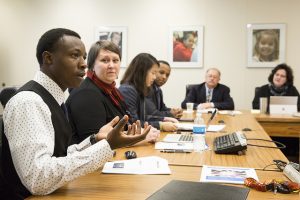Students Advocate Expansion of Racial Equity Efforts

North’s Robert Nishimwe, the student representative on the State Board of Education, makes a presentation about the efforts of the Community of Racial Equity.
Prior to its regular meeting Thursday morning the State Board of Education held a work session that featured a presentation by two DMPS high school students who are leaders of a group called the Community of Racial Equity (CORE).
North High’s Robert Nishimwe has been a member of the board since his appointment a year ago. Roosevelt High’s Nosa Ali has distinguished herself in many other ways throughout her DMPS career. In fact, in her role as promising student-scientist she had to be at the State Science & Technology Fair at Iowa State University in Ames. So, another accomplished student, IB Diploma candidate and fellow CORE founding sister Victoria Yin, ably sat in her place. Their co-presenters on the topic of reducing the achievement gap on AP college placement exams were Petra Lange, a former DMPS teacher and current Special Programs Coordinator in the School of Education at Drake University, and Charles Mercer, Community Outreach Coordinator at North. Both Lange and Mercer are CORE sponsors.
Robert came to the United States after being born in a refugee camp in Tanzania. We first chronicled his remarkable story when Governor Branstad appointed him to the Board of Ed last spring.
“Wait and see, fellow Board members – he will make his presence felt,” we wrote last spring in sharing the news of his appointment.
And so he has, Thursday’s PowerPoint being the most vivid case in point.
“My first question is, how can we keep you in Iowa?” asked board member Mike May.
“I want the board to know for the record how hard Robert worked on this presentation,” said Ryan Wise, Director of the Iowa Department of Education. “He consulted with (board president) Charles (Edwards) and I throughout and really did a great job.”
But Robert’s and Nosa’s and Victoria’s work is not aimed at earning kudos for themselves. It represents advocacy on behalf of others. They want the core of CORE that’s in place at Roosevelt and North to grow and expand to the rest of the district’s high schools and beyond to the point where, one day, it’s unnecessary.
A key point demonstrated by data contained in the group’s report and emphasized by the panel of presenters is that DMPS has done a good job of achieving equity of access when it comes to AP class enrollments and exam registrations. In recent years those numbers have exploded districtwide. Now the focus must turn to achieving equity of outcomes.
CORE is doing its part. The report outlined group activities ranging from providing professional development in cultural proficiency to teachers (that’s students teaching their teachers, to be clear) to holding FAFSA “parties” where high school students and their parents are coached through the labyrinth of application for federal financial aid for college.
Thursday’s session was like troops fresh from the frontlines falling back to headquarters to brief the generals on how to turn the tide of battle. What sorts of reinforcements are required to narrow the achievement gap in AP test scores, one of the Board of Ed’s stated priorities?
Robert clicked to a slide that summarized answers to that question:
- A state report on the situation, including student input;
- Funding for an array of teacher incentives;
- Department of Ed website features highlighting exceptional teachers and students of color.
Those are for starters. Locally, the short-term goal is to get CORE up and running at East, Lincoln and Hoover. What will that take?
“It takes a committed student and a committed staff person,” said Mercer. Robert learned of the group’s success at Roosevelt through contacts he made at Central Academy with people like Lange and Nosa and Victoria. “He brought the idea back to North and came to me with it,” said Mercer. Thus began chapter two last fall.
“I am not sure where I am headed next,” was Robert’s answer to May’s flattering question, by the way. “But wherever I go I will come back to Iowa, I can promise you that.”
By then he may be due for a promotion.




